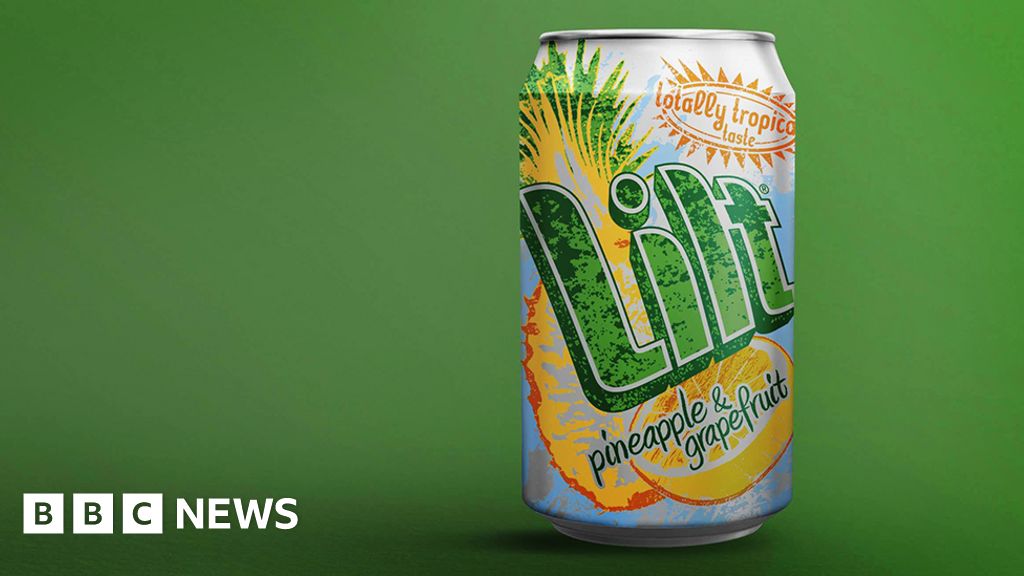Lilt Drink Brand To Be Scrapped And Renamed Fanta

The soft drink brand Lilt - famously advertised for its "totally tropical taste" - is being scrapped after 50 years and rebranded.
From Tuesday it will be known as Fanta Pineapple & Grapefruit, according to its owner the Coca-Cola Company.
The firm stressed the drink's taste and ingredients would not change.
But fans - many of whom appeared to associate Lilt with memories of their youth - took to social media to express their dismay.
"Fanta 'Grapefruit & Pineapple'... I'm still going to call it Lilt. Just like I still call the chewy sweets in paper Opal Fruits!" tweeted one.
"Farewell to Lilt. For some completely pointless reason they are rebranding it," tweeted another. "Apparently nothing is allowed to be different these days."
Launched in 1975, Lilt became a household name in the UK partly because of its advertising.
One television ad in the late 1980s featured the "Lilt Man", a parody of a milkman, delivering Lilt in a "Lilt float" on a Caribbean beach.
And in the 1990s, the drink was promoted with advertisements featuring two Jamaican women, Blanche Williams and Hazel Palmer, who became known in the media as the "Lilt Ladies".
Some Lilt fans guessed something was afoot when cans were redesigned last year using the Fanta font.
Coca-Cola, which owns a host of different soft drink brands around the world, said Lilt would no longer be sold under its current branding from 14 February, while Fanta Pineapple & Grapefruit bottles and cans were gradually rolled out across the UK.
"Our main priority with this announcement is to reassure Lilt's loyal fan base that absolutely nothing has changed when it comes to the iconic taste of the drink they know and love," Fanta brand manager Charlotte Walsham said. "It's just got itself a new name."
The firm told the BBC that the reason behind the rebrand was to make Lilt "fit in" with the Fanta family.
Cleopatra Veloutsou, professor of brand management at the University of Glasgow, said Coca-Cola probably felt the two brand names had a "high degree of similarity" and may have been "cannibalising" each other's sales.
The marketing budget for supporting both may no longer have made sense, and so Fanta would have been retained as it was the "stronger brand", she said, adding that other firms were making similar decisions.
Lilt was only ever sold in a handful of countries other than the UK including Ireland, Gibraltar and the Seychelles.
Brand name changes of the past
Though it is an expensive process, many major brands have tried changing names - although it has not always been a success.
In 1990, Marathon - one of the UK's most popular chocolate bars called - became Snickers.
Mars, which owned Marathon at the time, said it wanted to make the name of the chocolate bar the same across its global advertising for consistency.
Less successfully, cereal brand Coco Pops briefly rebranded to 'Choco Krispies' in 1998. After Coco Pops owner Kelloggs saw a decline in sales it set up a vote, and when 92% said they did not want the change the firm reverted to the original name.
The same year, popular sweet brand Opal Fruits became Starburst across the world.
More recently, in 2017 holiday firm Thomson changed its name to TUI. It got rid of the name it had used for more than half a century in order to adopt the name of its German parent company.
You may also be interested in:
From Chip War To Cloud War: The Next Frontier In Global Tech Competition
The global chip war, characterized by intense competition among nations and corporations for supremacy in semiconductor ... Read more
The High Stakes Of Tech Regulation: Security Risks And Market Dynamics
The influence of tech giants in the global economy continues to grow, raising crucial questions about how to balance sec... Read more
The Tyranny Of Instagram Interiors: Why It's Time To Break Free From Algorithm-Driven Aesthetics
Instagram has become a dominant force in shaping interior design trends, offering a seemingly endless stream of inspirat... Read more
The Data Crunch In AI: Strategies For Sustainability
Exploring solutions to the imminent exhaustion of internet data for AI training.As the artificial intelligence (AI) indu... Read more
Google Abandons Four-Year Effort To Remove Cookies From Chrome Browser
After four years of dedicated effort, Google has decided to abandon its plan to remove third-party cookies from its Chro... Read more
LinkedIn Embraces AI And Gamification To Drive User Engagement And Revenue
In an effort to tackle slowing revenue growth and enhance user engagement, LinkedIn is turning to artificial intelligenc... Read more

